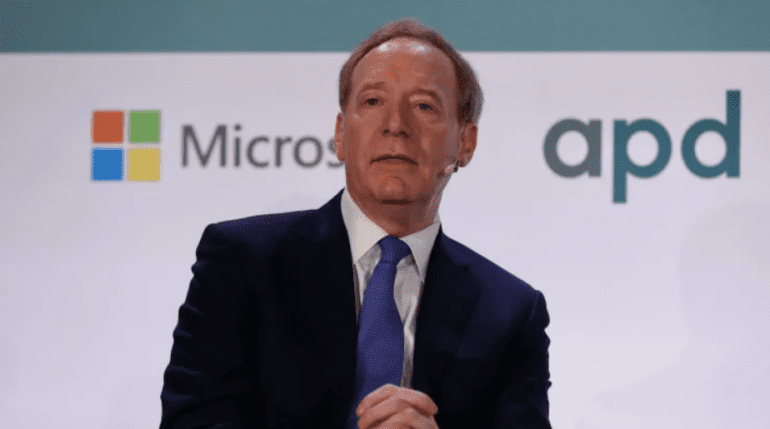TL;DR:
- Microsoft President Brad Smith meets with China’s Minister of Commerce Wang Wentao to discuss AI cooperation and trade relations.
- This meeting highlights China’s effort to maintain favorable ties with American businesses amid ongoing U.S.-China tensions.
- It follows the recent meeting between U.S. President Joe Biden and Chinese President Xi Jinping, signifying a desire for cooperation.
- China aims to improve the environment for foreign businesses, with a focus on better services for foreign enterprises.
- Microsoft’s role in AI, including its investment in OpenAI, makes it a key player in this collaboration.
- Chinese technology giants like Alibaba, Baidu, and Tencent are also active in AI development.
- Technology has been a contentious issue in U.S.-China relations, with restrictions on key technologies and components.
- The meeting aligns with the need to address AI risks, echoing discussions between U.S. and Chinese leaders.
- High-level meetings between U.S. tech firms and the Chinese government have become rare due to tensions.
- Recent visits by CEOs like Tim Cook (Apple) and Elon Musk (Tesla) to China signal a renewed interest in business ties.
- Microsoft expresses willingness to participate in China’s digital transformation and promote economic cooperation between China and the U.S.
Main AI News:
Microsoft President Brad Smith recently engaged in a crucial meeting with China’s Minister of Commerce, Wang Wentao, to explore avenues of collaboration encompassing artificial intelligence and trade relations. This high-profile rendezvous underscores China’s determined stance in fostering positive relationships with American enterprises, even amidst ongoing tensions with the United States, as the nation strives to revitalize its economic landscape.
The significance of Smith and Wang’s meeting becomes apparent in the wake of the recent dialogue between U.S. President Joe Biden and Chinese President Xi Jinping—a diplomatic gesture that signals both countries’ aspirations to collaborate in promising domains. Moreover, it reflects their shared ambition to enhance the business environment for foreign entities operating within their territories.
During the meeting, Minister Wang articulated China’s commitment to offering improved services for foreign corporations, as highlighted in the statement issued by the country’s commerce ministry. The ministry’s communication emphasizes the hope that Microsoft will play a “constructive role” in advancing cooperation concerning artificial intelligence between China and the United States. Microsoft’s stature as a major player in the realm of artificial intelligence, particularly following its substantial investment in ChatGPT developer OpenAI earlier this year, lends weight to this expectation.
Notably, China’s own technology giants, including Alibaba, Baidu, and Tencent, have been actively launching their AI models and competitive products. Technology has emerged as a contentious point of discussion between the U.S. and China in recent years, with Washington aiming to restrict China’s access to critical technologies like semiconductors. Furthermore, U.S. export restrictions have targeted essential components for training artificial intelligence models, such as Nvidia’s chips.
The dialogue between Presidents Biden and Xi previously emphasized the necessity of addressing the risks associated with advanced AI systems and enhancing AI safety through government-level talks between the U.S. and China—a sentiment that appears to resonate with Smith and Wang’s meeting.
In the context of escalating tensions between Washington and Beijing, meetings between U.S. technology firms and the Chinese government have become increasingly scarce. Additionally, there is a paucity of American tech companies actively operating within China, with major players like Google parent Alphabet and Meta facing restrictions in the world’s second-largest economy.
Nevertheless, recent developments have seen high-profile visits by CEOs of prominent American corporations to China. Apple CEO Tim Cook visited China, which constitutes the company’s third-largest market, while Tesla CEO Elon Musk made a significant trip to the nation, where the electric carmaker maintains one of its largest manufacturing facilities. These interactions have coincided with eased travel restrictions to China following the relaxation of intense Covid-19 measures in 2022, coupled with Beijing’s concerted efforts to attract foreign enterprises.
Brad Smith’s affirmation that Microsoft is eager to “actively participate in the digital transformation of China’s economy” underscores the company’s dedication to promoting economic and trade cooperation between China and the United States. This commitment holds the promise of fostering a mutually beneficial alliance in the field of artificial intelligence and beyond, as the global landscape continues to evolve.
Conclusion:
Microsoft’s proactive engagement with China in the field of artificial intelligence signifies a promising avenue for collaboration in an increasingly complex global market. As technology tensions persist, this commitment underscores the importance of strategic partnerships and highlights opportunities for growth and innovation in the AI sector.

